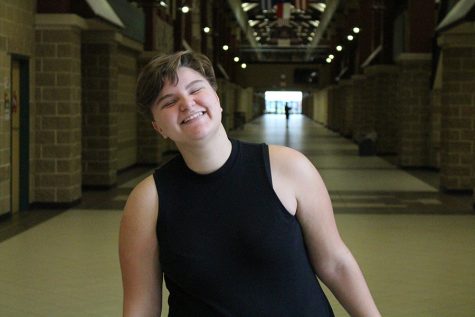Neurodivergent Experience
January 18, 2017
For as long as you can remember, you’ve been neurodivergent.
When you were in elementary school, start of kindergarten year, you couldn’t get along with people. Red marks covered the inside of your purple folder; you talked too much, couldn’t sit still, didn’t know your boundaries. You were upset, obviously, but at the time it was hard to say why. Having to sit out at recess was one thing, but there was something else that your toddler mind couldn’t wrap around.
Next year, first grade. You’re sent into a class one day with other kids. They act and behave “weirdly.” Like you do. You feel at home in this class room. It becomes a safe space for you. You talk about things that you want, and you’re allowed to be as hyper as you want to be. You make a friend, and he stays your best friend for many years.
You go to this classroom many times while you’re still go to that school. But one day, things change. You’re suddenly forced to go to another school. This school is a dictatorship, where as your other one was a democracy. It’s the fourth grade, you’re alone, and scared. The only person you know at the school that was your friend is your favorite teacher, from the special class you went to. He got moved too, which made you happy.
But your best friend moved away. You couldn’t help it and he couldn’t either. He’s sent to another school, and slowly, but surely, he isn’t your best friend anymore. A few months after the change, you experience “womanhood” for the first time in your life, at nine years old. You’re told that you’re becoming a lady, but the truth of the matter is that you didn’t want to be a lady. You’re nine. You hadn’t even reached double digits yet!
You become tired more as the days crawl by. Coming home from school, your backpack seeming heavier with each slow coming day, your only desire is to go to bed and sleep. Sleeping, you feel, saves you. You have control when you’re asleep. You have no control when you’re awake.
Your parents begin to worry about you. You’re sleeping more, and your agenda has nearly turned red, like your folder in kindergarten. Your teachers describe you as being overly emotional. “She cries too much.”, they say, “She throws things and gets easily angered.”, “She’s sad all the time and slacks on her work.”. One day, you don’t want to go to school. Your mother decides to take you to the doctor.
You sit in the waiting room, counting on your fingers until you’re called back by a nice looking lady. She takes your weight (they say you’re above average) and height (again above average), and then take you to a white room at the end of the hall. A chair sits in the middle, and you’re told to sit in it. You do.
The doctor comes with something that looks like a pin. They called it a butterfly. The butterfly flew into your arm, where your elbow was, and drew a flowing red liquid out of you. They took a lot of the liquid, then the butterfly flew out and the doctor patched you up, and asked you to keep your arm held out for about an hour. You take that seriously.
You sit in the car on your way home. Your mother tells you she’s planning on homeschooling you. You’re excited! Finally you get to be away from the mess that was your old school. Maybe then you can get better from whatever your parents thought you were sick with. You feel happy on your way home. It feels different. Genuine.
You’re home-schooled for your fifth grade year. Your mother tries her hardest, but she has doctor appointments as well, and your father works. You learn a lot from the books your mother picked up, with an additional few books just for fun. You love reading. Like sleeping, you feel like it’s an escape from whatever is going on in real life. You like the feel of adventure in books. One day you tried running away, to be adventurous. You took one step, and decided adventure just wasn’t for you.
You’re told you have to go back to school for sixth grade on. Middle school was scary for you. You feel like you go back. You start crying again, and feeling awful and helpless. One day you throw something, so your teacher calls security on you. It’s the first, and only, time you’ve ever felt handcuffs on your wrists. “To protect you,” they said. You didn’t understand how kids thinking you smoked weed for the next two years was “protecting” you.
Junior high ended up being a blur. You didn’t like it. It felt like the other school you went to, before being home-schooled, but disguised with the idea that one has more freedom after elementary. Really, you didn’t feel free. You found that there were many times that you sat in your upstairs classes where you just thought about crashing through the windows and flying away.
There was only one highlight to junior high. You met a new best friend. And another best friend. Ones that wouldn’t suddenly move away, that you felt comfortable talking to. They were like you in some ways, but the others ways were made up for by the fact that they wanted to help you. They knew you were struggling. And they wanted to be there for you every step of the way.
High school came after junior high. You changed a lot. Matured more. Allowed yourself to try and be happy. You feel like it helped a lot. Ninth grade year, and you felt great going into high school. You had the most caring teachers, and the most loving friends a person could ask for. Things were going smoothly. Until tenth grade.
Tenth grade year. You’re a sophomore. And you go back again. You cry and feel scared and helpless. You think once again about the windows. One day, you almost do it. The only thing that held you back was the thought of your best friend’s face had she seen you bleeding and broken on the pavement.
Your parents decide to consider medicine. You start on Xanax. For the anxiety. It helps, but it’s not enough. They take you to a psychiatrist, who finally explains your situation. You feel somehow at ease. Someone out there understands what you’ve been through. And you’re not alone. The thought helps.
You’re prescribed a series of anti-depressants and mood stabilizers throughout the next few months. Contrary to what others say, you never felt like an experiment, or a body filled with drugs. You feel like eyes. Broken eyes that finally have found glasses that work for them. You no longer feel an ache because your body struggles through the day. You feel at ease. You feel better.
Eleventh grade year. A junior. Still somewhat anxious and depressed. But you’re getting through it. You know now that you’re going to be okay. That there are people just like you in the world. That you’re not alone. That everything is going to be okay. That, again, you’re going to be okay.
You’re going to be okay.




